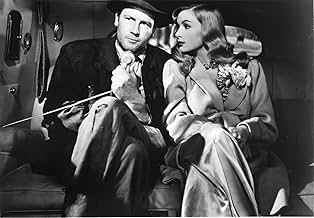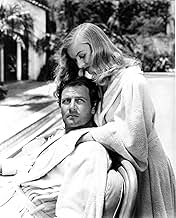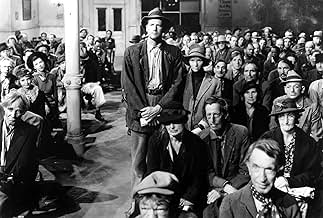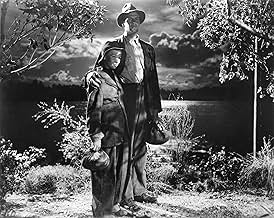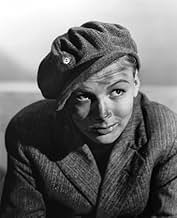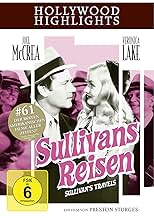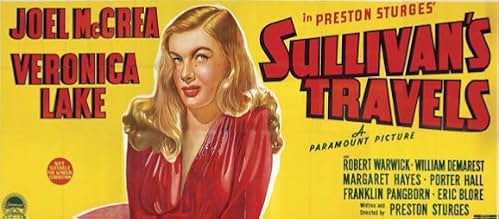AVALIAÇÃO DA IMDb
7,9/10
30 mil
SUA AVALIAÇÃO
John L. Sullivan, um diretor de Hollywood, se propõe a viver como um sem-teto a fim de adquirir experiência de vida relevante para seu próximo filme.John L. Sullivan, um diretor de Hollywood, se propõe a viver como um sem-teto a fim de adquirir experiência de vida relevante para seu próximo filme.John L. Sullivan, um diretor de Hollywood, se propõe a viver como um sem-teto a fim de adquirir experiência de vida relevante para seu próximo filme.
- Prêmios
- 2 vitórias no total
Charles R. Moore
- Colored Chef
- (as Charles Moore)
Avaliações em destaque
Preston Sturges (1898-1959) wrote over 40 film screenplays spanning the years 1930-1958 and directed over a dozen films 1940-1955. His first attempt at directing was a success with a string of two popularly and critically acclaimed films in each of the years 1940 and 1941, "The Great McGinty", "Christmas in July"; "The Lady Eve" (starring Henry Fonda and Barbara Stanwyck), and this film, "Sullivan's Travels".
The beauty of "Sullivan's Travels" is the combination in genre of comedy as well as social satire and realism of the tough times of the Great Depression that the country had just weathered for a decade. Throw a romance in to the mix and a level of redirection of a "film on film" to make this an interesting film.
John Sullivan (Joel McCrea) is a famous director who is at odds with his production company. They want him to direct a comic film, while he wants to apply his talent to creating an analytic looking glass onto the sobering times called, "O Brother, Where Art Thou?". Wealthy and successful, he is mocked for not at all knowing misfortune - how would he make such a film? John takes this as a challenge, dresses as a hobo, and leaves the studio with a dime in his pocket to explore what life is like for the down and out.
However he tries to flee, he ends up getting somehow quickly being returned to Hollywood. Early on, he meets "the girl" (Veronica Lake; I don't recall her ever being given a name in the film) who sees that he is too innocent to survive on his own, and insists on bringing her broader knowledge of society to the journey and joining him to get him through this learning adventure.
The first part of the film is comic, but just as it seems to be coming to an unfulfilled ending, something unexpected happens. This event alters the course of everything and exposes John to some of the true injustices of the time - and shows him (and poignantly reminded me) that comedy is particularly important when some people have nothing else to cheer them up.
This is a film of classic Hollywood vintage, with good, snappy performances by both of the lead actors. The romance isn't at all developed but just seems to happen in a matter-of-fact way (perhaps we can take it on faith that there is instant chemistry), but what is lacking in psychology of the relationship is made up for in the chilling glimpse we get of the psyche of the underdog in Depression America.
--Dilip Barman June 19, 2004
The beauty of "Sullivan's Travels" is the combination in genre of comedy as well as social satire and realism of the tough times of the Great Depression that the country had just weathered for a decade. Throw a romance in to the mix and a level of redirection of a "film on film" to make this an interesting film.
John Sullivan (Joel McCrea) is a famous director who is at odds with his production company. They want him to direct a comic film, while he wants to apply his talent to creating an analytic looking glass onto the sobering times called, "O Brother, Where Art Thou?". Wealthy and successful, he is mocked for not at all knowing misfortune - how would he make such a film? John takes this as a challenge, dresses as a hobo, and leaves the studio with a dime in his pocket to explore what life is like for the down and out.
However he tries to flee, he ends up getting somehow quickly being returned to Hollywood. Early on, he meets "the girl" (Veronica Lake; I don't recall her ever being given a name in the film) who sees that he is too innocent to survive on his own, and insists on bringing her broader knowledge of society to the journey and joining him to get him through this learning adventure.
The first part of the film is comic, but just as it seems to be coming to an unfulfilled ending, something unexpected happens. This event alters the course of everything and exposes John to some of the true injustices of the time - and shows him (and poignantly reminded me) that comedy is particularly important when some people have nothing else to cheer them up.
This is a film of classic Hollywood vintage, with good, snappy performances by both of the lead actors. The romance isn't at all developed but just seems to happen in a matter-of-fact way (perhaps we can take it on faith that there is instant chemistry), but what is lacking in psychology of the relationship is made up for in the chilling glimpse we get of the psyche of the underdog in Depression America.
--Dilip Barman June 19, 2004
No need to add to the praise others have justly given this classic, but there's one thing I think is especially clever about the plot (without giving too much of it away). The apparent moral of this Depression-era movie is that bad as conditions may be, audiences don't need to be reminded about them, instead needing escapist fare to distract them from the world's problems. Meanwhile, after setting you up to relax and enjoy a screwball comedy, Sturges succeeds in surreptitiously drawing you into just the kind of bleak "social consciousness" movie his characters are saying is impossible to get people to watch, without your realizing it at the time. Well, without my realizing it, anyway, until much later.
As a professional circus clown for twenty years,I think that Sullivan's Travels is the best, most lucid, explanation of what comedy is all about that has ever been made. Sure it's hokey, corny, contrived, and meandering. But so is all great comedy, from Shakespeare to Seinfeld! If you want your comedy to be tightly constructed, meaningful, unambiguous, and logical, then you do not want comedy at all -- you want some stuffy college professor's idea of What is Comedy for a term paper.
The glorious truth is that you cannot domesticate great comedy. It occurs on no regular basis, from no reliable source, and is accountable to no one for what it says and does. Preston Sturges wanted to make that point in Sullivans Travels and he does so exceedingly well with everything from slapstick frolics in the land cruiser to fleas in the bed to hectoring soliloquies about poverty from the butler.
Ten years before Chaplin tried to explain the same thing in his movie Limelight, Sturges tells a tale meant to both hearten and cozen us. It heartens us to know that a cynical, moneygrubbing place like Hollywood will continue to spin out comedies, because they make money. And it cozens us into thinking there is something magical about comedians. Anyone who has ever actually known or been married to a professional funnyperson knows they are by turns grumpy, lazy, tempermental, stubborn, and always insecure. Not the life of the party. But so what? They're clowns, god bless 'em, and that's all that counts.
You'll never understand the craft of humor if you don't watch, and love, Preston Sturges Sullivan's Travels!
The glorious truth is that you cannot domesticate great comedy. It occurs on no regular basis, from no reliable source, and is accountable to no one for what it says and does. Preston Sturges wanted to make that point in Sullivans Travels and he does so exceedingly well with everything from slapstick frolics in the land cruiser to fleas in the bed to hectoring soliloquies about poverty from the butler.
Ten years before Chaplin tried to explain the same thing in his movie Limelight, Sturges tells a tale meant to both hearten and cozen us. It heartens us to know that a cynical, moneygrubbing place like Hollywood will continue to spin out comedies, because they make money. And it cozens us into thinking there is something magical about comedians. Anyone who has ever actually known or been married to a professional funnyperson knows they are by turns grumpy, lazy, tempermental, stubborn, and always insecure. Not the life of the party. But so what? They're clowns, god bless 'em, and that's all that counts.
You'll never understand the craft of humor if you don't watch, and love, Preston Sturges Sullivan's Travels!
As original a piece from the 1940s as you'll likely come across and one where it could quite easily have found itself as knotted and gnarled as some of the boots seen pounding the highways and byways of its cast. Fortunately those pretentious rips fail to appear and it's the arrival of Veronica Lake that turns the ramble to a journey and an illustration as relevant today about the lack of opportunity we continually chose to turn a blind eye to. An interesting twist towards the end provides something to chew on and supports a finale that may well give you a little to smile about, maybe even a chuckle.
In Hollywood, the spoiled director of humdrum movies, John Lloyd Sullivan (Joel McCrea), was born in silver spoon but is very successful with his superficial comedies. Out of the blue, he tells to his producer Mr. LeBrand (Robert Warwick) that he wants to make serious dramas, like "O Brother, Where Art Thou?" and he will live like a tramp on the streets to learn the sorrows of great part of the population. He wears cheap clothes and tries to blend with poor people but he always returns to Hollywood protected by the safety team hired by the studio.
One day, he goes to a dinner with a coin and a blonde girl (Veronica Lake) offers bacon and eggs to him. Soon he learns that the girl is a failed actress that had never a chance in Hollywood and is returning home hitchhiking without any money. Sullivan decides to retribute her kindness giving a ride to her in his car but they are arrested by the police. When they are released, the girl decides to join Sullivan in his quest to learn about poverty. When Sullivan is satisfied, he is robbed and dumped unconscious in a train. He awakes in the countryside where there is an incident and he is arrested and sentenced to a labor camp, where he leans the importance of comedy in the miserable lives of destitute people.
"Sullivan's Travels" is a delightful movie by Preston Sturges with a satire of Hollywood lifestyle and the importance of comedy in the life of people, a relief for a couple of minutes for those that do not have other sort of entertainment. Joel McCrea is very funny in the role of a naive director trying to find how the poor people live. His chemistry with the gorgeous Veronika Lake is perfect and this was the first time that I noted that this lovely actress was only 1.51 m height. My vote is eight.
Title (Brazil): "Contrastes Humanos" ("Human Contrasts")
One day, he goes to a dinner with a coin and a blonde girl (Veronica Lake) offers bacon and eggs to him. Soon he learns that the girl is a failed actress that had never a chance in Hollywood and is returning home hitchhiking without any money. Sullivan decides to retribute her kindness giving a ride to her in his car but they are arrested by the police. When they are released, the girl decides to join Sullivan in his quest to learn about poverty. When Sullivan is satisfied, he is robbed and dumped unconscious in a train. He awakes in the countryside where there is an incident and he is arrested and sentenced to a labor camp, where he leans the importance of comedy in the miserable lives of destitute people.
"Sullivan's Travels" is a delightful movie by Preston Sturges with a satire of Hollywood lifestyle and the importance of comedy in the life of people, a relief for a couple of minutes for those that do not have other sort of entertainment. Joel McCrea is very funny in the role of a naive director trying to find how the poor people live. His chemistry with the gorgeous Veronika Lake is perfect and this was the first time that I noted that this lovely actress was only 1.51 m height. My vote is eight.
Title (Brazil): "Contrastes Humanos" ("Human Contrasts")
Você sabia?
- CuriosidadesCinematographer John Seitz admired Preston Sturges' unconventional approach to his work. The opening scene comprised ten pages of dialogue to cover about four and a half minutes of screen time. It was scheduled for two complete days of shooting. On the morning of the first day, Seitz found Sturges inspecting the set with a viewfinder, looking for where he could cut the scene and change camera set-ups. Seitz dared him to do it all in one take. Never one to refuse a dare, Sturges took him up on it, although the nervous Seitz had never attempted to complete a two-day work schedule in one day. With the endorsement of McCrea and the rest of the actors, Sturges pressed on, determined to set a record. The first take was fine, but the camera wobbled a little in the tracking shot following the men from screening room to office, so they tried again. They did two or three takes at the most and that was it - two full days work by 11 a.m. on the first day, a feat that had the entire studio buzzing.
- Erros de gravaçãoWhen Sullivan and the Girl jump off the train and walk to the lunch stand, nothing is visible around the outside of the lunch stand--not a car, tree or anything. When Sullivan asks if the proprietor had seen a land yacht (a big RV), the proprietor points to the side and they look out the window and see the big land yacht parked there. Of course, if it had been there in the first place, Sullivan would have seen it right away and not gone into the lunch stand.
- Citações
[last lines]
John L. Sullivan: There's a lot to be said for making people laugh. Did you know that that's all some people have? It isn't much, but it's better than nothing in this cockeyed caravan.
- Cenas durante ou pós-créditosThe Paramount logo appears as a seal on a package.
The package is opened to reveal a book with the film title on it and the opening credits appear on pages in the book.
- ConexõesFeatured in The Cinematographer (1951)
- Trilhas sonorasSpring Song
(1844) (uncredited)
Written by Felix Mendelssohn
Played as part of the score when Sullivan starts his experiment
Reprised when he starts a second time
Principais escolhas
Faça login para avaliar e ver a lista de recomendações personalizadas
Detalhes
- Data de lançamento
- País de origem
- Idioma
- Também conhecido como
- Sullivan's Travels
- Locações de filme
- Empresa de produção
- Consulte mais créditos da empresa na IMDbPro
Bilheteria
- Orçamento
- US$ 689.665 (estimativa)
- Faturamento bruto mundial
- US$ 10.390
- Tempo de duração
- 1 h 30 min(90 min)
- Cor
- Proporção
- 1.37 : 1
Contribua para esta página
Sugerir uma alteração ou adicionar conteúdo ausente


